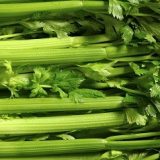Eating with the Season
 In our global economy, when we can buy anything at any time, is there any good reason to eat seasonally? In fact, there is.
In our global economy, when we can buy anything at any time, is there any good reason to eat seasonally? In fact, there is.
Buying seasonal fruits and vegetables is more economical. Have you ever looked at the price of asparagus in the fall and then in the spring when it’s in season? Obviously spring is the time to buy those tender stalks.
Local, seasonal produce provides us with optimal flavor and maximum nutrients. The reasons are multifold:
- The produce is harvested when it’s at its peak of readiness. The ripened produce has the full complement of vitamins and minerals that allow our bodies to thrive! In contrast, food grown remotely has to be picked well before ripeness to account for extra transit time. By picking too early, the produce doesn’t develop its full array of nutrients.
- The length of time for food shipment affects the vitamins and minerals by allowing break down. Once produce arrives at a typical supermarket after being shipped across the country, it has lost about half of its vitamin C levels, as an example.
- Seasonal foods taste better. Have you ever bit into a tomato (shipped from South America) in the winter? It has no taste and it’s usually mealy. Compare that to local tomatoes picked at the height of summer when their natural flavors are at their maximum. Delicious! The reason is the same as before — produce picked too early hasn’t had the time to develop all hte nutrients. These nutrients give the produce the flavor that we all cherish.
- Buying seasonally and locally allows us more variety of plants species. We can buy varieties that are optimized for flavor and nutrition rather than transit robustness.
- When we buy in the season, we reduce our carbon footprint. Food harvested locally doesn’t need to be shipped across the country and refrigerated extensively; each of us is in effect reducing the emissions into our environment.
Our bodies are designed to obtain the maximum benefits of eating foods that are in season. Have you ever noticed that you crave certain foods during certain times of the year? Our family loves all the summertime fruits (right now) that are sweet and juicy. But usually during winter, we want warming foods that can be classified as “comfort foods.” Let me explain:
- As the seasons rotate, so too do our bodies need to adjust. Before refrigeration, our ancestors had to rely on what was seasonal because they had no means of storing foods for long periods of time.
- During the fall (which is a transition period), the body is preparing for winter. The body will start to transition to wanting more warming foods (think soup for those cooler nights). You will most likely be eating fruits and vegetables that are orange or yellow in color. These foods, high in vitamin A, will support our immune systems for the upcoming winter colds.
- Winter is a time when the earth takes a rest. With the cold temperatures, our bodies look for warming foods (i.e. stews and hearty soups). Most fruits are not as available. Root veggies (carrots, potatoes, turnips, and parsnips, for example) are at their peak and provide us with their stored energy supplies.
- With spring comes the rebirth of the earth, and to a degree, our own rebirth. The body needs to be cleansed of the heavier winter foods. Fortunately, the springtime bounty is full of light, green, leafy veggies (examples include lettuces, kale, spinach, chard, and dandelion greens) that will cleanse us and prepare us for the coming hot, summer months.
- And finally we have summer. The warm summer days encourage us to be outside. Foods that will nourish us are ones that are refreshing and have a high water content. These replenishing fruits and veggies will cool us down from the hot summer days. It’s also the perfect season to enjoy fruits and veggies in their raw states, which will provide us with a full complement of nutrients. So now that the summer solstice has just past, stock up on your favorite summer produce and enjoy. For a few summer recipes, click on the link http://www.bettereatingcoach.com/recipes.
In future columns, I will focus on various aspects of good and wholesome food ranging from specific foods to generalized nutrition tips. A whole foods diet provides us with the building blocks to health and wellness.
© Geri Wohl, Better Eating Coach











